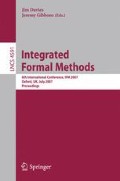Abstract
Linearizability is a correctness criterion for concurrent objects. In this paper, we prove linearizability of a concurrent lock-free stack implementation by showing the implementation to be a non-atomic refinement of an abstract stack. To this end, we develop a generalisation of non-atomic refinement allowing one to refine a single (Z) operation into a CSP process. Besides this extension, the definition furthermore embodies a termination condition which permits one to prove starvation freedom for the concurrent processes.
Access this chapter
Tax calculation will be finalised at checkout
Purchases are for personal use only
Preview
Unable to display preview. Download preview PDF.
References
Abrial, J.-R., Cansell, D.: Formal Construction of a Non-blocking Concurrent Queue Algorithm (a Case Study in Atomicity). Journal of Universal Computer Science 11(5), 744–770 (2005)
Abrial, J.-R., Cansell, D., Mery, D.: Refinement and Reachability in Event_B. In: Treharne, H., King, S., Henson, M.C., Schneider, S. (eds.) ZB 2005. LNCS, vol. 3455, pp. 222–241. Springer, Heidelberg (2005)
Back, R.-J.: Atomicity refinement in a refinement calculus framework. Reports on Computer Science and Mathematics 141, Abo Akademi (1993)
Colvin, R., Doherty, S., Groves, L.: Verifying concurrent data structures by simulation. ENTCS 137, 93–110 (2005)
Derrick, J., Wehrheim, H.: Using coupled simulations in non-atomic refinement. In: Bert, D., Bowen, J.P., King, S. (eds.) ZB 2003. LNCS, vol. 2651, pp. 127–147. Springer, Heidelberg (2003)
Derrick, J., Wehrheim, H.: Non-atomic refinement in Z and CSP. In: Treharne, H., King, S., Henson, M.C., Schneider, S. (eds.) ZB 2005. LNCS, vol. 3455, Springer, Heidelberg (2005)
Derrick, J., Boiten, E. (eds.): Refinement in Z and Object-Z: Foundations and Advanced Applications, Formal Approaches to Computing and Information Technology, May 2001. Springer, Heidelberg (2001)
Derrick, J., Boiten, E., Bowman, H., Steen, M.: Specifying and Refining Internal Operations in Z. Formal Aspects of Computing 10, 125–159 (1998)
Doherty, S., Groves, L., Luchangco, V., Moir, M.: Formal verification of a practical lock-free queue algorithm. In: de Frutos-Escrig, D., Núñez, M. (eds.) FORTE 2004. LNCS, vol. 3235, pp. 97–114. Springer, Heidelberg (2004)
Duke, R., Rose, G., Smith, G.: Object-Z: A specification language advocated for the description of standards. Computer Standards and Interfaces 17, 511–533 (1995)
Fischer, C.: CSP-OZ - a combination of CSP and Object-Z. In: Bowman, H., Derrick, J. (eds.) Second IFIP International conference on Formal Methods for Open Object-based Distributed Systems, July 1997, pp. 423–438. Chapman & Hall, Sydney (1997)
Groves, L., Colvin, R.: Derivation of a scalable lock-free stack algorithm. ENTCS (to appear, 2007)
Hendler, D., Shavit, N., Yerushalmi, L.: A scalable lock-free stack algorithm. In: SPAA 2004: Proceedings of the sixteenth annual ACM symposium on Parallelism in algorithms and architectures, pp. 206–215. ACM Press, New York (2004)
Herlihy, M., Wing, J.M.: Linearizability: A correctness condition for concurrent objects. ACM Transactions on Programming Languages and Systems 12(3), 463–492 (1990)
Hoare, C.A.R.: Communicating Sequential Processes. Prentice-Hall, Englewood Cliffs (1985)
Lamport, L., Schneider, F.B.: Pretending atomicity. Technical Report TR89-1005, SRC Digital (1989)
Lipton, R.J.: Reduction: a method of proving properties of parallel programs. Commun. ACM 18(12), 717–721 (1975)
Roscoe, A.W.: The Theory and Practice of Concurrency. International Series in Computer Science. Prentice-Hall, Englewood Cliffs (1998)
Smith, G.: The Object-Z Specification Language. Kluwer Academic Publishers, Dordrecht (2000)
Woodcock, J.C.P., Davies, J.: Using Z: Specification, Refinement, and Proof. Prentice-Hall, Englewood Cliffs (1996)
Author information
Authors and Affiliations
Editor information
Rights and permissions
Copyright information
© 2007 Springer-Verlag Berlin Heidelberg
About this paper
Cite this paper
Derrick, J., Schellhorn, G., Wehrheim, H. (2007). Proving Linearizability Via Non-atomic Refinement. In: Davies, J., Gibbons, J. (eds) Integrated Formal Methods. IFM 2007. Lecture Notes in Computer Science, vol 4591. Springer, Berlin, Heidelberg. https://doi.org/10.1007/978-3-540-73210-5_11
Download citation
DOI: https://doi.org/10.1007/978-3-540-73210-5_11
Publisher Name: Springer, Berlin, Heidelberg
Print ISBN: 978-3-540-73209-9
Online ISBN: 978-3-540-73210-5
eBook Packages: Computer ScienceComputer Science (R0)

